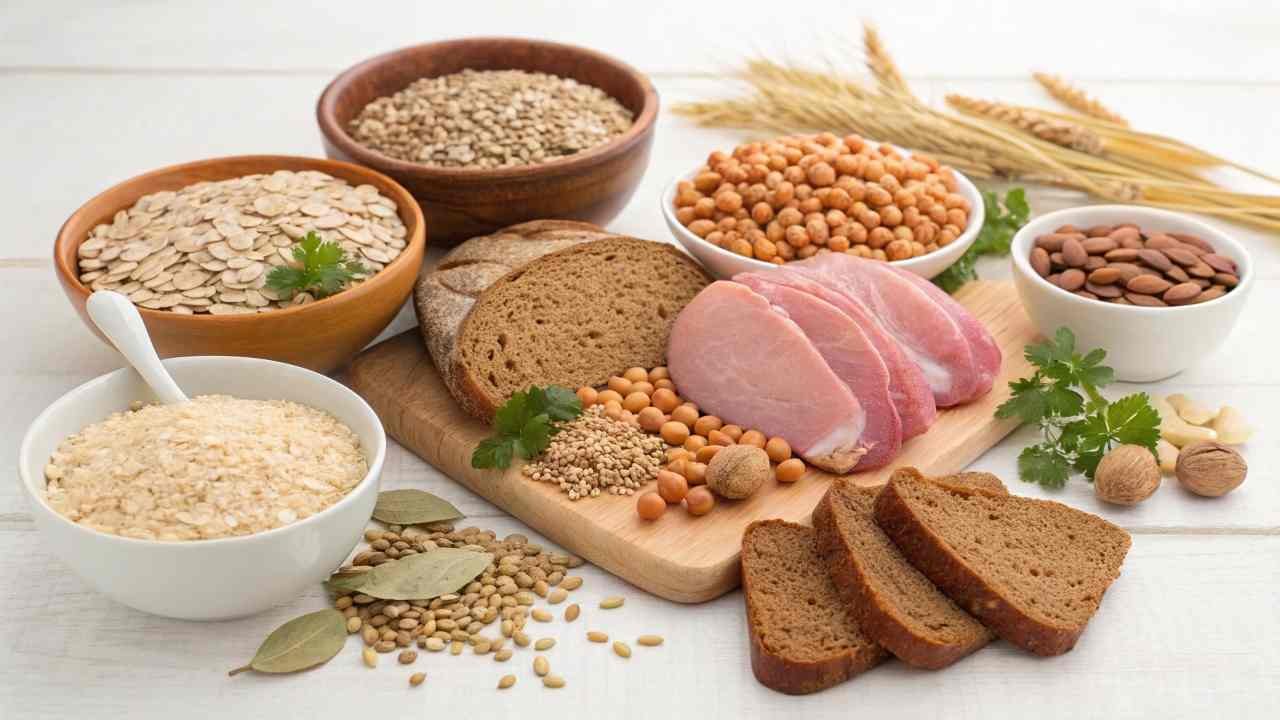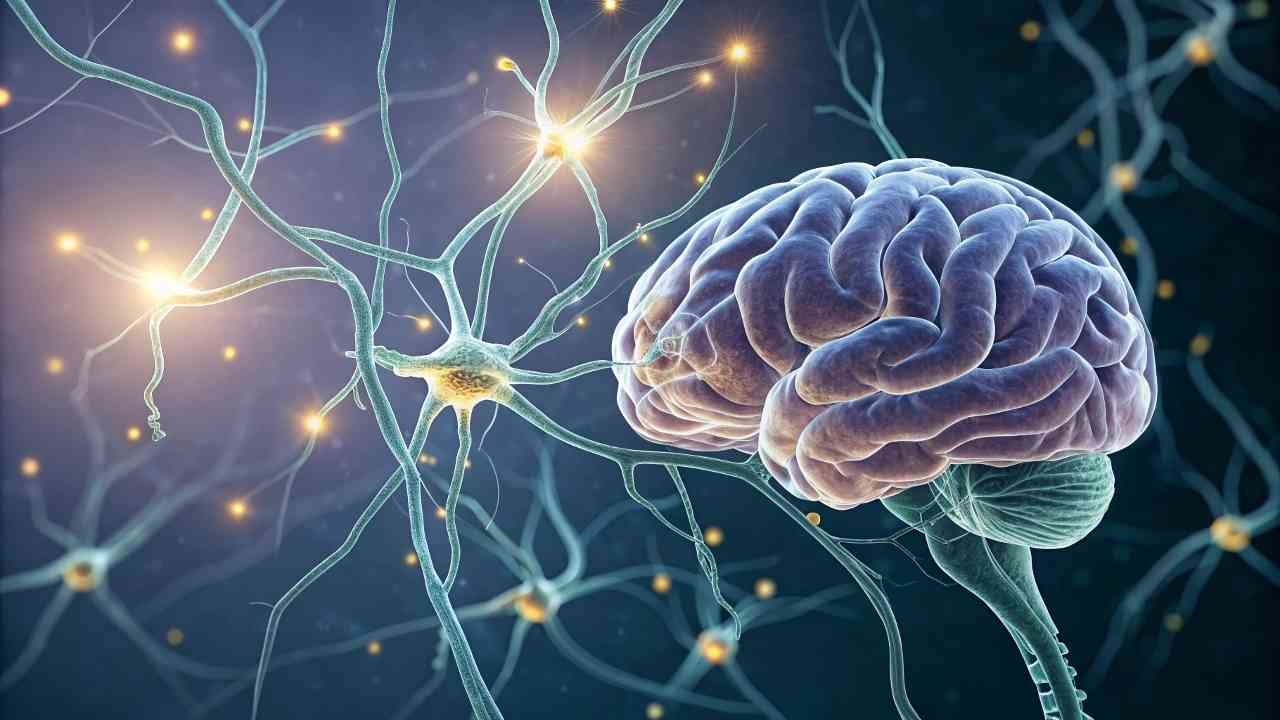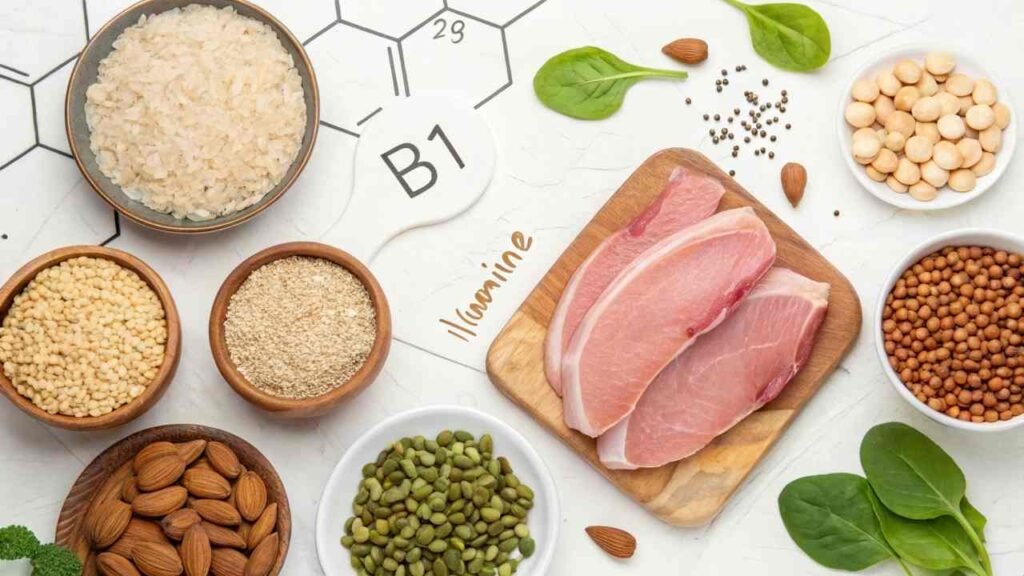Feeling tired or foggy? Your diet might be missing Vitamin B1. Thiamine is key for energy and brain health. Let's cover the essentials.
Vitamin B1 converts food to energy and supports nerves. Get it from whole grains, pork, legumes, nuts. Low levels cause fatigue, irritability, nerve problems.
At FINETECH, we deal with food fortification ingredients, including vitamins. Understanding Vitamin B1 is important for manufacturers and everyone. Clear information helps clients appreciate quality sourcing. Let's look at thiamine.
What are the most common natural food sources rich in Vitamin B1?
Want more Vitamin B1 naturally? Which foods are best? Let's pinpoint top thiamine sources.
Best Vitamin B1 sources: whole grains (brown rice, oats), pork, legumes (beans, lentils), nuts (macadamia), seeds (sunflower), and fortified cereals or breads.

Getting enough B1 is possible if you know what to eat. Some foods are much better sources than others.
- Whole Grains: Brown rice, whole wheat bread, oatmeal. The B1 is in the germ/bran.
- Fortified Grains: Enriched white bread, breakfast cereals (B1 added back).
- Pork: A very rich meat source. Organ meats like liver are also high.
- Legumes, Nuts, Seeds: Black beans, lentils, macadamia nuts, sunflower seeds.
- Some Fish & Veggies: Trout, salmon, green peas, asparagus.
Top B1 Food Groups:
| Food Group | Examples | B1 Richness |
|---|---|---|
| Whole Grains | Brown rice, Oats | High |
| Fortified Grains | Enriched bread, Cereals | High (Added) |
| Pork | Tenderloin, Chops | Very High |
| Legumes | Beans, Lentils | High |
| Nuts & Seeds | Macadamia, Sunflower seeds | High |
A balanced diet with these foods helps maintain B1 levels.
How does cooking or processing food affect its Vitamin B1 content?
Worried cooking destroys B1? Do processed foods lack it? Let's see how thiamine is affected.
Vitamin B1 is water-soluble and heat-sensitive. Boiling, long cooking, grain milling (removing bran/germ), alkali, and sulfites significantly reduce thiamine.

Thiamine is delicate. Understanding its stability is important for consumers and for food fortification1.
- Heat: Prolonged high heat destroys B1. Steaming or stir-frying is better than boiling.
- Water: B1 leaches into cooking water. If water is discarded, B1 is lost.
- Alkali (e.g., Baking Soda): Speeds up B1 destruction.
- Sulfites (Preservatives): Can destroy thiamine.
- Milling Grains: Removing bran/germ (for white flour/rice) removes most B1. This is why fortification with thiamine is common.
Impact Summary:
| Factor | Effect on B1 | Better Choice |
|---|---|---|
| Heat/Boiling | Destroys/Leaches | Steam, Stir-fry, Use less water |
| Alkali | Destroys | Avoid adding baking soda |
| Sulfites | Destroys | Check labels |
| Milling | Removes (from grains) | Choose whole or fortified grains |
Choosing whole foods and gentle cooking helps preserve B1.
Are there specific lifestyle factors or diets that increase the need for Vitamin B1?
Could your lifestyle or diet raise your B1 needs? Let's check factors that demand more thiamine.
Yes, high carb diets, heavy alcohol use, some medical conditions (malabsorption, diabetes, dialysis), pregnancy/lactation, and intense exercise can increase Vitamin B1 requirements.

Some situations increase B1 demand or impair its use:
- High Carbohydrate Intake2: More B1 is needed to process carbs for energy. Diets high in refined carbs can deplete B1.
- Heavy Alcohol Use3: Impairs B1 absorption and storage, increases excretion, and often comes with poor diet. Major risk for deficiency.
- Medical Conditions4: Malabsorption (Crohn's), diabetes, kidney disease needing dialysis, bariatric surgery, hyperthyroidism.
- Medications: Diuretics can increase B1 loss.
- Increased Needs: Pregnancy, breastfeeding, intense physical activity.
- Restrictive Diets: If B1-rich food groups are excluded.
Factors Boosting B1 Needs:
| Factor | Why More B1 Needed |
|---|---|
| High Carbs | Needed for carb-to-energy conversion |
| Alcohol Abuse | Impairs absorption/use, poor diet |
| Health Issues | Malabsorption, Diabetes, Dialysis (loss) |
| Life Stages | Pregnancy, Lactation (growth) |
| High Activity | Higher energy demands |
Recognizing these factors helps address potential shortfalls.
What are the early, noticeable symptoms if someone is low on Vitamin B1?
Feeling off? Could it be low Vitamin B1? Let's spot the early warning signs of thiamine deficiency.
Early B1 deficiency symptoms: fatigue, irritability, poor memory/concentration, loss of appetite, sleep problems, weight loss, muscle weakness, or tingling/numbness in hands/feet.

Early signs of low thiamine can be vague and easily missed:
- General: Fatigue, low energy, poor appetite, weight loss, sleep issues.
- Mood/Cognitive: Irritability, anxiety, poor memory, difficulty concentrating.
- Muscular/Nerve: Muscle weakness, cramps, tingling or numbness (especially in hands/feet).
- Gastrointestinal: Indigestion, constipation.
If not addressed, this can lead to more severe conditions like beriberi (affecting nerves/heart) or Wernicke-Korsakoff syndrome (severe neurological issues, often in alcoholics).
Early Signs Summary:
| Category | Examples |
|---|---|
| General | Fatigue, Poor appetite |
| Mood/Brain | Irritability, Poor memory/focus |
| Nerves/Muscles | Weakness, Tingling/numbness |
Consult a doctor if you suspect deficiency, as symptoms can have many causes.
Why is Vitamin B1 important for nerve function and cognitive health?
How does B1 keep your brain and nerves working well? What's its role? Let's explore B1's importance for the nervous system.
Vitamin B1 (as TPP) is vital for energy production in nerve cells, making neurotransmitters (brain chemicals), forming/maintaining myelin (nerve insulation), and protecting nerves from damage.

The brain and nerves need lots of energy, mostly from glucose. Thiamine is crucial for this:
- Energy Supply: B1 is key for enzymes that convert glucose into ATP (cell energy). Nerve cells need lots of ATP. Lack of B1 starves them of energy.
- Neurotransmitters5: B1 helps make and balance brain chemicals like acetylcholine (memory/learning) and GABA.
- Myelin Sheath6: B1 aids in making myelin, the fatty insulation around nerves that allows fast signal transmission. Damage here causes nerve problems.
- Nerve Protection: B1 helps protect nerve cells from oxidative stress (damage by free radicals).
Impact of B1 on Nerves/Brain:
| B1 Role | Why It's Important |
|---|---|
| Energy for Nerve Cells | Powers nerve signals, cell maintenance |
| Neurotransmitter Production | Essential for brain communication, mood, memory |
| Myelin Health | Ensures fast, efficient nerve impulse travel |
| Antioxidant Support | Protects nerves from damaging oxidative stress |
B1's roles in these areas make it fundamental for a healthy brain and nervous system.
Conclusion
Vitamin B1 is essential for energy metabolism and healthy nerve function. Get it from diverse foods, be mindful of cooking losses, and recognize factors that increase needs or signal deficiency.
-
This resource will explain how food fortification improves public health and addresses nutrient deficiencies. ↩
-
Understanding the impact of high carbohydrate intake on B1 can help manage dietary choices effectively. ↩
-
Exploring this link can provide insights into the risks of alcohol on nutrient absorption and overall health. ↩
-
Learning about medical conditions related to B1 deficiency can help in early detection and management. ↩
-
Understanding neurotransmitters is essential for grasping their role in cognitive functions like memory and learning. ↩
-
This link will explain the importance of the myelin sheath in ensuring efficient nerve signal transmission and preventing nerve issues. ↩


